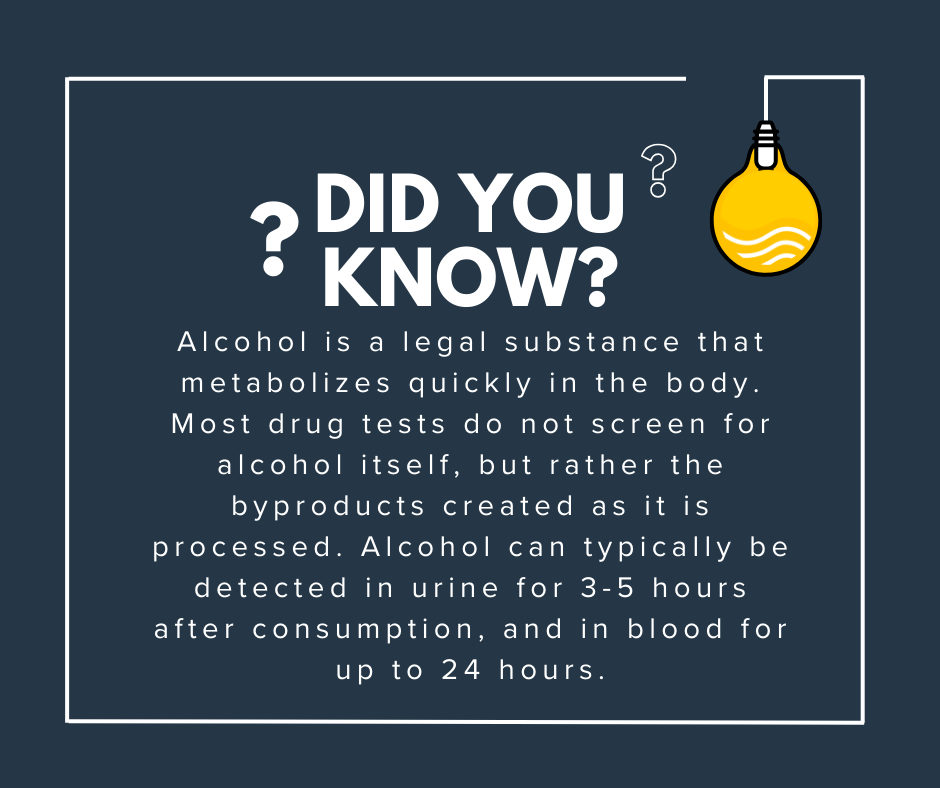As a job seeker, you need to be informed about what will and will not show up in your pre-employment drug test. You may be wondering if that glass of wine with dinner last night or celebratory champagne at your friend’s wedding will cause you to fail your upcoming screening. While illegal substances like marijuana, cocaine, and methamphetamines are obvious failures, the answer for alcohol is more nuanced. Learn what types of drug tests check for alcohol, how long alcohol stays in your system, and what levels could lead to a positive test. Arm yourself with knowledge before your test day so you can pass with confidence. Knowing the facts ahead of time will give you peace of mind about any alcohol you’ve consumed recently.
Alcohol Addiction Treatment
Understanding Alcohol Addiction
Alcohol addiction, or alcoholism, is a chronic brain disease characterized by compulsive alcohol use, loss of control over intake, and a negative emotional state when not using. It is a serious and complex condition that impacts all aspects of life – physical, mental, and social.
Treatment Options
Seeking professional help is crucial for overcoming alcohol addiction. Treatment approaches may involve:
- Detoxification to manage withdrawal symptoms safely.
- Behavioral therapies like cognitive-behavioral therapy (CBT) to modify harmful drinking patterns.
- Medications to reduce cravings and prevent relapse.
- Support groups like Alcoholics Anonymous for peer encouragement.
Comprehensive Care
Effective treatment addresses the whole person, not just the alcohol abuse. An integrated approach combining medical, psychological, and social services tailored to individual needs is recommended for long-term recovery success.
Medical Detox
Safe Withdrawal Process
If you have developed a physical dependence on alcohol, quitting suddenly can be dangerous and even life-threatening. Medical detox provides a safe, supervised process to withdraw from alcohol. Trained professionals monitor your vital signs and provide medications to manage severe withdrawal symptoms.
Supervised Environment
During detox, you reside at a facility for several days. This allows around-the-clock monitoring and support. Medical staff can administer FDA-approved medications to ease insomnia, seizures, and other complications. A medically-managed detox greatly reduces health risks compared to quitting “cold turkey.”
Transition to Treatment
Completing detox is just the first step of recovery. Detox stabilizes your physical dependence, preparing you to enter an addiction treatment program. Inpatient or outpatient rehab provides therapy, counseling, and strategies to achieve long-term sobriety. Detox alone has low success rates without follow-up treatment.
Group Therapy
Group therapy offers a unique and powerful setting for individuals struggling with alcohol or substance abuse. In these sessions, you join others on similar journeys, fostering a sense of community and shared understanding.
A Safe Space for Healing
Group therapy provides a safe, non-judgmental environment to open up about your experiences. Hearing others’ stories can help you feel less alone and more understood.
Accountability and Support
Regularly attending group meetings fosters accountability. Group members can support and encourage one another through setbacks and celebrate milestones together.
New Perspectives
Hearing diverse viewpoints from fellow members can offer fresh insights into your own situation. Their experiences may shed light on coping strategies you haven’t considered.
Developing Interpersonal Skills
Group interactions allow you to practice communication, empathy, and relating to others in healthy ways. These interpersonal skills aid recovery and overall well-being.
Group therapy complements individual counseling by creating a supportive community. Through shared wisdom and mutual encouragement, the healing journey feels a little easier.
Dual Diagnosis Treatment
Understanding Dual Diagnosis
Dual diagnosis refers to the presence of both a substance abuse disorder and a mental health condition in an individual. These co-occurring disorders can interact and exacerbate each other, making treatment more complex.
Integrated Treatment Approach
For effective dual diagnosis treatment, an integrated approach is recommended. This means simultaneously addressing both the substance abuse issue and the mental health condition through a combination of therapies and interventions.
Therapies & Support
Common therapies used in dual diagnosis treatment include:
- Cognitive behavioral therapy (CBT) to modify harmful thoughts and behaviors
- Medication management for mental health symptoms
- Individual and group counseling
- Family therapy and education
- >Support groups and peer support
- Life skills training
The goal is to achieve long-term recovery by treating the whole person, not just the separate disorders. With comprehensive, evidence-based care, individuals with dual diagnosis can improve their quality of life.
EMDR
Eye Movement Desensitization and Reprocessing (EMDR) therapy is a psychotherapy treatment designed to alleviate distress associated with traumatic memories. It combines exposure therapy techniques with a series of guided eye movements that help the brain reprocess and integrate disturbing memories.
How It Works
EMDR helps individuals better process traumatic memories that are “stuck” and prevent them from fully healing. The back-and-forth eye movements are thought to facilitate the resumption of normal information processing and integration.
This allows the memory to be re-filed into a more appropriate memory network, lessening its psychological impact. The alternating eye movements may help unlock the neurophysiological system responsible for information processing.
Benefits
EMDR has been extensively researched and proven effective for trauma, PTSD, anxiety, depression, phobias, panic disorders and more. It can help:
- Process disturbing memories/events
- Desensitize triggers and emotional distress
- Install positive self-beliefs
- Facilitate emotional healing
EMDR is an empirically validated treatment recognized as a first-line intervention by the American Psychological Association and World Health Organization.
Statistics of Alcohol on Drug Tests
Alcohol Detection Time
Alcohol is a legal substance that metabolizes quickly in the body. Most drug tests do not screen for alcohol itself, but rather the byproducts created as it is processed. Alcohol can typically be detected in urine for 3-5 hours after consumption, and in blood for up to 24 hours.
False Positives
There is a slight chance that certain substances like isopropanol or ethylene glycol could cause a false positive for alcohol on some tests. However, more advanced testing methods can differentiate between these compounds and ethanol from alcoholic beverages.
Blood Alcohol Content
Some employers may conduct breathalyzer tests to measure an employee’s blood alcohol content (BAC) before work. The legal limit is usually 0.08% BAC, but many have zero tolerance policies. High BAC readings could be grounds for disciplinary action.

FAQ:
Standard Drug Tests
Most standard drug tests do not screen for alcohol use. Alcohol metabolizes quickly and is eliminated from the body within a few hours after drinking stops. Standard workplace drug tests look for substances like marijuana, cocaine, opioids, amphetamines, and PCP – not alcohol.
Specialized Tests
There are specialized tests that can detect alcohol metabolites like ethyl glucuronide (EtG) and ethyl sulfate (EtS). These advanced tests analyze blood, urine, or hair samples and can detect alcohol use over a longer period – anywhere from 3-4 days up to 3 months after heavy drinking.
However, these specialized alcohol tests are not commonly used for workplace drug testing. They are more likely to be ordered in certain legal, treatment, or other specific situations.
False Positives
Importantly, some products like hand sanitizers, household cleaners, and non-alcoholic beverages contain very small amounts of alcohol that could potentially cause a false positive on an EtG/EtS test. Discussing potential exposures with the testing facility is wise.
The Bottom Line
For standard workplace drug tests, alcohol use will not be detected. But specialized tests designed specifically to check for alcohol metabolites over an extended period can identify recent drinking. As always, being truthful about substance use is advisable.
Conclusion
You now understand that alcohol does not typically show up on standard drug tests. While alcohol leaves your system quickly, it can be detected by more specialized tests for a day or two after drinking. Knowing how long alcohol stays in your system can help you avoid detection if abstinence is required. Going forward, be mindful of alcohol’s potential to show up on certain drug screens. If abstaining from alcohol is necessary for you, take measures to avoid consumption entirely rather than trying to time it before a test. Being informed enables you to make responsible choices regarding alcohol use.
Begin Your Journey with Evoke Wellness at Miramar
If you or a loved one is considering treatment for Alcoholism, Evoke Wellness at Miramar invites you to contact us. Our compassionate team is ready to answer your questions, discuss your needs, and help you take the first steps toward recovery. In Miramar, you’ll find more than just a treatment program – you’ll discover a community dedicated to your wellness and success. Together, let’s embrace the journey to recovery and the promise of a new beginning. Call us at (833) 819-6066 today or reach out online.


